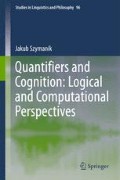Abstract
Generalized quantifier theory tends to focus on distributive readings of natural language determiners. In contrast, this last chapter is devoted to collective readings of quantifiers, e.g., “Most students played poker together”. I start by introducing the common strategy of formalizing collective quantification by using certain type-shifting operations. I show that all these lifts turn out to be definable in second-order logic. Next, I introduce an alternative approach to modeling collective quantification by means of second-order generalized quantifiers and develop a definability theory for them. I study the collective reading of the proportional quantifier ‘most’ and prove that it is not definable in second-order logic. Therefore, there is no second-order definable lift expressing the collective meaning of the quantifier ‘most’. This is clearly a restriction of the type-shifting approach. I finish by discussing various methodological interpretation of this result, touching again upon the issues of complexity in natural language and the semantic borders of everyday language.
Access this chapter
Tax calculation will be finalised at checkout
Purchases are for personal use only
Notes
- 1.
See also van Benthem (1991).
References
Andersson, A. (2002). On second-order generalized quantifiers and finite structures. Annals of Pure and Applied Logic, 115(1–3), 1–32.
van Benthem, J. (1986). Essays in Logical Semantics. Reidel.
van Benthem, J. (1988). The semantics of variety in categorial grammar. Report 83–29, Department of Mathematics, Simon Fraser University, 1983. In W. Buszkowski, W. Marciszewski, & J. van Benthem (Eds.), Categorial Grammar. Linguistic and Literary Studies in Eastern Europe (Vol. 25, pp. 37–55). Amsterdam: John Benjamins.
van Benthem, J. (1991). Language in Action: Categories, Lambdas and Dynamic Logic. Cambridge: North-Holland, Amsterdam: MIT Press.
Bartsch, R. (1973). The semantics and syntax of number and numbers. In J. P. Kimball (Ed.), Syntax and Semantics 2 (pp. 51–93). New York: Seminar Press.
Ben-Avi, G., & Winter, Y. (2003). Monotonicity and collective quantification. Journal of Logic, Language and Information, 12(2), 127–151.
Ben-Avi, G., & Winter, Y. (2004). A characterization of monotonicity with collective quantifiers. Electronic Notes in Theoretical Computer Science, 53, 21–33.
Bennett, M. R. (1974). Some Extensions of a Montague Fragment of English. Ph.D. thesis. University of California, Los Angeles.
Burtschick, H. J., & Vollmer, H. (1998). Lindström quantifiers and leaf language definability. International Journal of Foundations of Computer Science, 9(3), 277–294.
van der Does, J. (1992). Applied Quantifier Logics. Collectives and Naked Infinitives. Ph.D. thesis. University of Amsterdam.
van der Does, J. (1993). Sums and quantifiers. Linguistics and Philosophy, 16(5), 509–550.
Frege, G. (1980). Philosophical and Mathematical Correspondence of Gottlob Frege. University of Chicago Press.
Kamp, H., & Reyle, U. (1993). From Discourse to Logic: Introduction to Model-Theoretic Semantics of Natural Language, Formal Logic and Discourse Representation Theory. Studies in Linguistics and Philosophy. Berlin: Springer.
Kontinen, J. (2002). Second-order generalized quantifiers and natural language. In M. Nissim (Ed.) Proceedings of the Seventh ESSLLI Student Session (pp. 107–118). Elsevier.
Kontinen, J. (2004). Definability of Second Order Generalized Quantifiers. Ph.D. thesis. Helsinki University.
Kontinen, J., & Szymanik, J. (2008). A remark on collective quantification. Journal of Logic, Language and Information, 17(2), 131–140.
Kontinen, J., & Szymanik, J. (2014). A characterization of definability of second-order generalized quantifiers with applications to non-definability. Journal of Computer and System Sciences, 80(6), 1152–1162.
Link, G. (1983). The logical analysis of plurals and mass terms: A lattice-theoretical approach. In R. Bäuerle, C. Schwarze, & A. von Stechow (Eds.), Meaning, Use, and Interpretation of Language (pp. 302–323). Berlin: Gruyter.
Lønning, J. T. (1997). Plurals and collectivity. In J. van Benthem & A. ter Meulen (Eds.), Handbook of Logic and Language (pp. 1009–1053). Elsevier.
Partee, B., & Rooth, M. (1983). Generalized conjunction and type ambiguity. In R. Bäuerle, C. Schwarze, & A. von Stechow (Eds.), Meaning, Use, and Interpretation of Language (pp. 361–383). Berlin: Gruyter.
Russell, B. (1903). The Principles of Mathematics. Cambridge: Cambridge University Press.
Scha, R. (1981). Distributive, collective and cumulative quantification. In J. A. G. Groenendijk, T. M. V. Janssen, & M. B. J. Stokhof (Eds.), Formal Methods in the Study of Language, Part 2 (pp. 483–512). Amsterdam: Mathematisch Centrum.
Winter, Y. (2001). Flexibility Principles in Boolean Semantics. London: The MIT Press.
Author information
Authors and Affiliations
Corresponding author
Rights and permissions
Copyright information
© 2016 Springer International Publishing Switzerland
About this chapter
Cite this chapter
Szymanik, J. (2016). Complexity of Collective Quantification. In: Quantifiers and Cognition: Logical and Computational Perspectives. Studies in Linguistics and Philosophy, vol 96. Springer, Cham. https://doi.org/10.1007/978-3-319-28749-2_10
Download citation
DOI: https://doi.org/10.1007/978-3-319-28749-2_10
Published:
Publisher Name: Springer, Cham
Print ISBN: 978-3-319-28747-8
Online ISBN: 978-3-319-28749-2
eBook Packages: Social SciencesSocial Sciences (R0)

